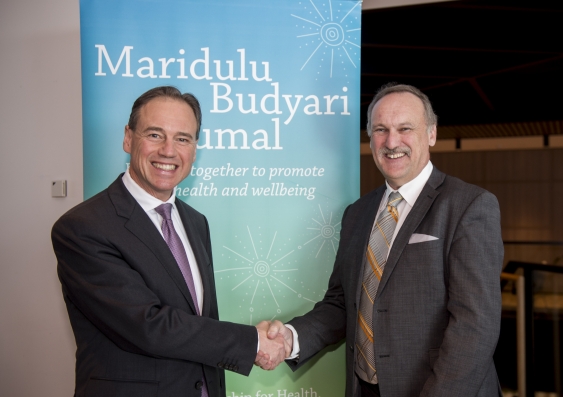SPHERE receives $6m boost to deliver improved health care
SPHERE, a venture between 14 partners in health, education and medical research, will receive $6 million from the Medical Research Future Fund.
SPHERE, a venture between 14 partners in health, education and medical research, will receive $6 million from the Medical Research Future Fund.

Lucy Carroll
UNSW External Communications
9385 8732, 0402 005 319
l.carroll@unsw.edu.au
The federal government’s Medical Research Future Fund (MRFF) will contribute $6 million over three years to Sydney Partnership for Health Education Research and Enterprise (SPHERE), Health Minister Greg Hunt announced today at UNSW Sydney.
Professor Ian Jacobs, President and Vice-Chancellor of UNSW Sydney and inaugural Chair of SPHERE, said: “This funding enables us to extend our work and go beyond to deliver more impactful, focused outcomes for patients and health services. We are delighted to accept this new funding from the Australian federal government to continue our research to reshape the way we approach important health issues through innovation and translation to deliver practical solutions.”
Other National Health and Medical Research Council (NHMRC) accredited centres were to receive similar funding, Mr Hunt said.
SPHERE, which is also known by its Dharug Indigenous name Maridulu Budyari Gumal, is a partnership between 14 leading organisations that aims to connect research, education and health care delivery organisations to provide better health care for communities in NSW. It was officially launched as a NHMRC accredited Advanced Health Research and Translation Centre (AHRTC) in Sydney in April last year.
In the past 12 months, SPHERE activities have been gaining momentum through the establishment of 12 Clinical Academic Groups (CAGs) and key strategic programs that are working to address major health challenges in areas including Aboriginal health and wellbeing, ageing, maternal, newborn and women’s health.
Through these groups and programs, SPHERE has already made some significant breakthroughs that reflect the power of bringing people together who were previously in unconnected groups, to focus on translating research into impact, an important part of Australia’s health and medical research policy.
The Genome Connect CAG is one group that focuses on translating the complexities of genomic testing into clinical practice. Led by Associate Professor Tony Roscioli from Neuroscience Research Australia (NeuRA) and UNSW, Genome Connect has pioneered the establishment of multidisciplinary care using both face-to-face clinics and telehealth to combine best-practice clinical genomics and genetic counselling with the latest lab genomics testing.
Many families who have a child with a severe disability often struggle to find an answer as to how or why it happened. The members of Genome Connect have, through SPHERE, worked together to provide state-of-the-art genomic testing to help provide answers to these questions as well as avenues for treatment.
Another revolutionary program being driven by SPHERE is the Cancer CAG, led by Scientia Professor of Radiation Oncology at UNSW, Michael Barton. Working in collaboration with the Cancer Institute NSW, and under the leadership of Professor Afaf Girgis and Professor Geoff Delaney from UNSW Medicine, they have developed a patient-reported outcome measurement system, the Patient-Reported Outcome Measures for Personalised Treatment and Care (PROMPT-Care).
Despite evidence that patient reported outcomes are increasingly important and have the potential to improve cancer outcomes, routinely collecting information about a patient’s health condition directly from the patient is rare.
To overcome these challenges, PROMPT-Care was developed, the first e-health system in Australia that is fully integrated in hospital oncology information systems (OIS), enabling routine collection of PROs. It has informed the care of more than 440 patients in South Western Sydney Local Health District (SWSLHD) and Illawarra Shoalhaven LHD (ISLHD).
“Studies have shown that sometimes patients report different outcomes to that of the clinicians,” said Professor Delaney, Director of Cancer Services for SWSLHD and Director of Liverpool Cancer Centre. “I have seen a gap between clinical care to optimal care and felt we needed to build something where patients enter data, similar to a survey, that gets fed into our system, comes back in real time and highlights area of concern. It is important to have a report of the patient’s health condition that comes directly from the patient, without interpretation of the patient’s response by a clinician.
“There is no data set in NSW of patient reported outcomes. Patents feel better supported if the clinical team are aware of their patient-reported outcomes and there is evidence that it changes care.”
PROMPT-Care is the first fully integrated e-health system of its kind in Australia. The key feature distinguishing PROMPT-Care from previous oncology-based e-health systems is its total integration into the hospital’s OIS, which has not been achieved in other projects.